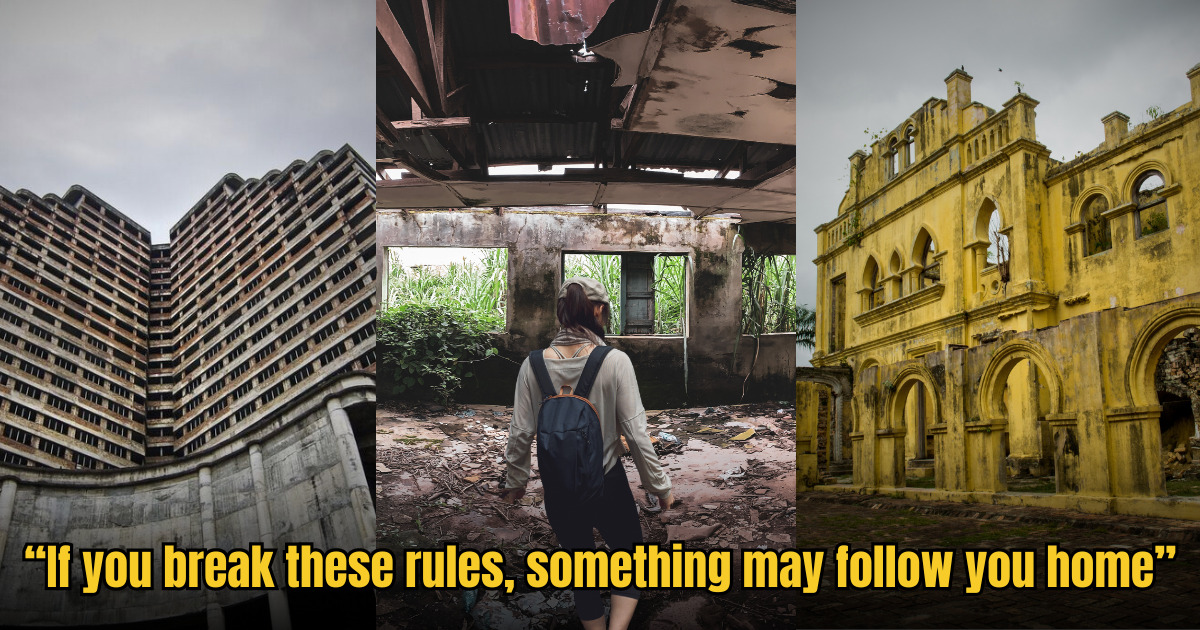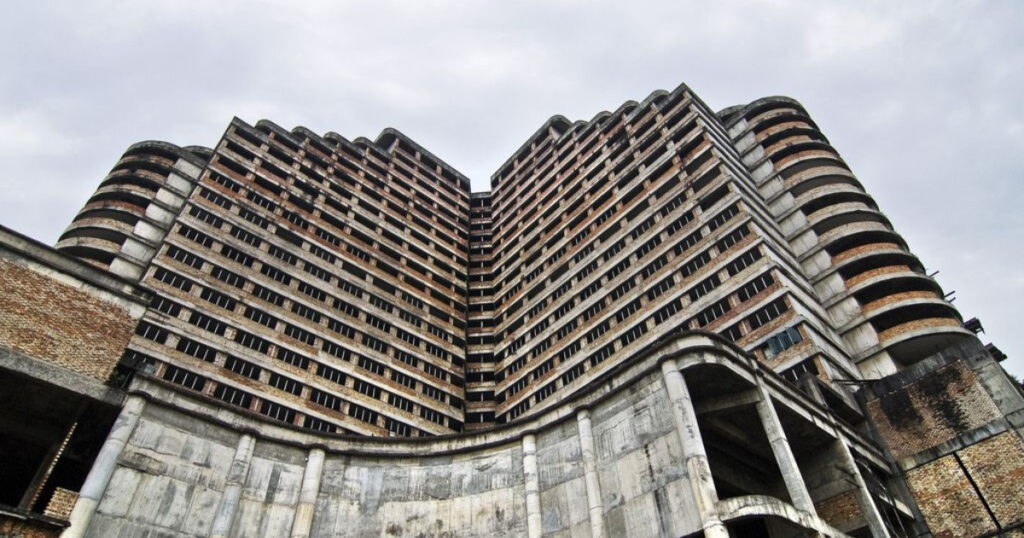Disclaimer: In Real Life is a platform for everyday people to share their experiences and voices. All articles are personal stories and do not necessarily echo In Real Life’s sentiments.
Subscribe to our Telegram for updates.
Malaysia is known for many locations that have built up a reputation for being haunted by spirits. As an amateur paranormal investigator, I’ve been to a few of these haunted places myself.
These include Kellie’s Castle in Perak, Selangor’s Highland Towers, the British fort turned Penang War Museum, and of course the home of the infamous pop singer turned murderer Mona Fandey, located in Shah Alam’s Seksyen 12.
Every Malaysian knows of a few ‘rules’ or guidelines to follow so that you can avoid an unwanted ghostly encounter. Here are 7 basic rules to keep yourself safe when passing through a haunted space in Malaysia:
#1. Respect the spirits by asking for permission.

Malaysian folklore is full of tales of those who paid a price or were punished for angering denizens of the spirit realm. They may follow you home and take up residence in your house, or place a curse on you which results in sickness or ill fortune.
After all, you may have permission to enter a space by its living caretakers, but you still need special permission from the dead.
Say “permisi” or “maaf” (ask for permission/apologise in advance) when you enter these places as a sign of respect to these unseen entities. This is something I have made a habit to do at every supernatural place I visit.
This may get you permission from the “Datuk” or “Orang Bunian” (the invisible folk), and also the appropriate spiritual protection before proceeding with your journey.
Some extra careful Malaysians will perform this step when entering any hotel room they visit, whether it’s a 5 star hotel or a simple hostel. Do this if you are concerned about any spiritual occupants that may have taken up residence in the space, especially those that haven’t had human visitors in months.
#2. Follow the advice of the spiritual elders.
Before entering a haunted or spiritual place, follow the advice of the local elders, shamans and spirit guides on what rituals and practices to observe.
These rituals can include prayers, chants, or the use of protective amulets or other totems. This is especially important in places that are held to be sacred.
For example, when investigating a suspected haunting with Chinese origins, it’s common practice to carry convex mirrors, or protective symbols such as the “Fu” character, to reflect away evil spirits.
Keep your voice low, be polite, and follow local customs. Don’t verbally challenge anyone, taunt, or use foul language in areas they reside in.
Showing disrespect will also meet with real world consequences from real-life humans, so apply common sense here and you won’t go wrong.
#3. Don’t speak the names of the spirit – or the living.
The Orang Asli in Sabah and Sarawak have lived in the Malaysian jungles for centuries. One of the many beliefs that they hold fast to is: Do not speak the name of a deceased or spirit out where they could be lurking, lest you wish to attract their attention.
If you do so, you may be seen as inviting them into your presence, where they may reside permanently, whether in your objects, or sometimes within your body.
For example, if you are hiking in the jungle and you see a banana tree, you may be tempted to tell your friend, “Hey, let’s avoid that tree, because a pontianak may spawn.” Do not say its full name out loud, for in doing so, you may inadvertently summon it.
Similarly, if you are going to traverse a deep part of the jungle with some friends, avoid calling each other by your real names. This prevents the spirits from knowing your name and following you home.
A Sarawakian friend of mine whom I knew as Parang had never, ever used a person’s real name whenever he went out into the jungle. I knew him for two years before I realised “Parang” was his nickname and not actually his name!
#4. Offer gifts as a gesture of goodwill.
In various cultures, it is believed that offering gifts or sacrifices can appease spirits or entities. This may involve leaving food, flowers, or other items as a gesture of goodwill.
Many locations that are known to be haunted will have a temple or an altar where you can leave prayers and such offerings.
For example, this is why Chinese homes have an altar for spirits to receive offerings and prayers. It is believed that adherence to the tenants of Feng Shui creates a harmonious and peaceful environment for the human and otherworldly residents alike.
If you are preparing a gift for the spirits, ensure that any offerings given are made with the appropriate prayers by an elder, following the tradition and custom of the local entities.
#5. If you lose an item, don’t search for it.

Image: The abandoned Amber Court apartments near Genting Highlands.
Sometimes, when you enter a haunted location, something you brought with you will go missing. It could be the bic lighter in your cigarette pack, or even a valuable ring or earring.
Whatever you have lost, just don’t go looking for it. The spirits have claimed it as part of the price of allowing you to be in their “space” or area.
Once, while I was exploring the Highland Towers, I lost a ring I’d worn for 20 years. I only realised that it was missing when we found it as we were leaving, lying innocently in the middle of the path.
I didn’t want to leave it behind, but the rules are the rules: Better to lose the ring than have something with evil intent use it as a beacon and follow me home.
#6. Don’t bring home souvenirs
Never take anything from the site of an investigation back to your home as a souvenir or a “memento.” You can never be sure what might resonate strongly with a spirit. Do your best to not disturb the physical nature of a location.
If not, you may get a run of bad luck that continues until you either return the item (if you’re lucky) or until you are forced to move out. A far worse possibility is that you may have an angry spirit that ends up following, haunting and cursing you wherever you go.
This is especially true in places that have historical significance like the Penang War Museum, or are sacred like ancient graveyards or temples where supernatural phenomena have been recorded in the past.
#7. Don’t forget! Practise personal safety.
Now before you go visiting haunted places, remember to get proper legal permission from property owners, pack appropriate protection like pepper spray in case of wild animals, and be appropriately dressed for your exploration.
As an amateur paranormal investigator, I’ve always wanted to have a polite, respectful encounter with the supernatural to be able to believe that such things exist.
Fortunately, I’ve followed these rules on all of my explorations and investigations, and nothing has ever followed me home. I’ve been ghost- and ghoul-free!
Unfortunately, while having visited, explored, and seen some truly haunting scenes of desolation, I’ve not found a spirit either.
Since Halloween is coming up, anybody wanna go explore the graveyard in Taman Pinggiran Ukay? Or we could cruise the Karak highway between 11pm and 2am, and see what we can see…
Did we miss out on any rules?
Share your thoughts in the comments!
Submit your story to ym.efillaerni@olleh and you may be featured on In Real Life Malaysia.
More from Real People
‘A RM100 fee cost a company 5 years of revenue’ shares M’sian
This story is about a Malaysian who learned that bureaucracy can be defeated simply by not arguing with it.A billing …
‘I quiet-quit, upskilled, and tripled my salary,’ shares M’sian engineer
This story is about a Malaysian who learned that loyalty without leverage leads nowhere in the corporate world.After years of …
‘I did everything right, and it still wasn’t enough’ shares M’sian graduate
This story is about a Malaysian graduate navigating big dreams in a job market where a degree no longer guarantees …















